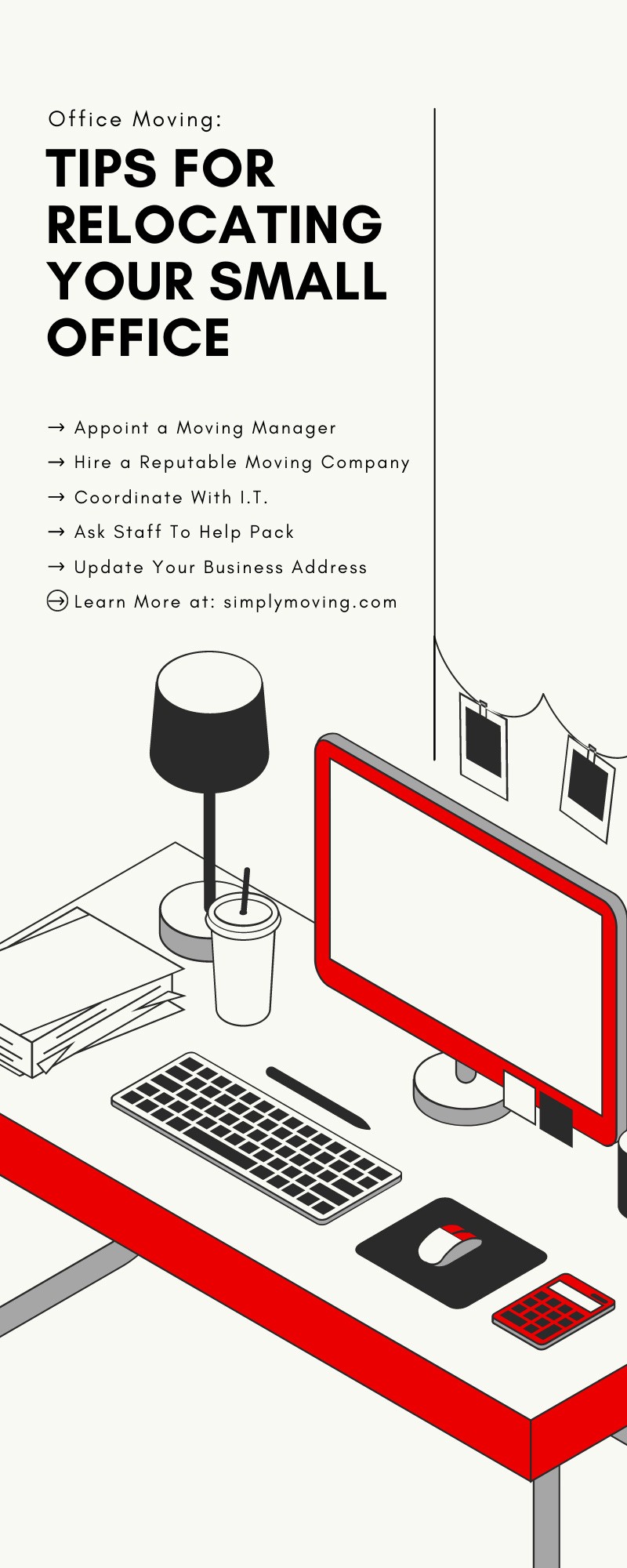Have you outgrown your office space? Maybe you found one down the road that will save your company money. Either way, relocating your office is a big decision and a challenging thing to do. Use these tips for relocating your small office to start making your move.
Moving your business requires a great deal of coordination. Ensure you talk to the right people when you follow this guide.
Appoint a Moving Manager
Elect someone to manage the move as soon as you know you may want to move offices. If your office is small because your business is small, you may oversee managing the activity. Essential to any move is a budget that details how much you’ll spend on which services.
Review Your Lease
At least six months prior to moving, review your lease. The details in your current lease will help you prepare to leave. It will tell you how much cleaning to do and how to get your deposit back. Further, the lease may detail when and how to move out of the building.
Hire a Reputable Moving Company
Once you know you’re relocating your small office, begin looking for a reputable local moving company. The advantage of hiring small office movers in NYC is that they know the traffic and public regulations. Further, local companies often charge less because they work within your specific neighborhoods.
Look at reviews to determine which companies you can trust. Next, call the ones with the best reviews to compare quotes and see who will give you the best deal.
Schedule Movers as Soon as Possible
Don’t wait to book your move, especially if you get a good moving rate; book as soon as you plan to relocate your office. Hesitating to schedule may result in a delay. Moving companies book up fast, which means you may not get the day and time you desire if you don’t schedule well in advance.
Pro Tip: Ask about cancellation policies in case plans change. A good moving company is willing to answer any of your questions.
Tell Employees About the Move
Be transparent with your employees about your plans for relocation. Even if you don’t move, let them know if you’re looking at other spaces. Springing a relocation on your staff last-minute may cause more harm than proposing a possible move and then staying put.
Once you decide to move, keep staff updated on the new building’s address, regulations, and layout. People will be curious about the new building and the reason for the move. Be honest about your motivations and what it means for the company to prevent rumors from spreading.
Coordinate With I.T.
One of the most challenging parts of moving an office of any size is transporting your infrastructure. Coordinate with your I.T. department or contractor to help you move your data, servers, computers, phones, and internet plan to your new location. Help your department decide what to keep and what you can sell or donate.
List Your Inventory
If packing your office seems overwhelming, begin by making a list of all your inventory. Once you know what is in your office, you can decide what to bring to the new location and what to sell or donate. Use your inventory list to help you keep track of important items and determine where they should go in your new office.
Ask Staff To Help Pack
Your employees can move their own items to the new location. Ask staff to pack up their desks before the move. In addition to their personal items, staff can move their computers and other small items such as:
- Scanners
- Phones
- Lamps
- Notebooks
- Keyboards
- Monitor stands
- Desk accessories
Label Boxes
Like packing your house, you should label any boxes. Help your movers when you use a simple labeling system. Mark which rooms or areas you want each box to end up in, so you don’t have to move them yourself. Further, labeling your boxes will tell movers which items to take and which to leave behind.
Update Your Business Address
A common mistake many people make when they move is negating to change their address. The same is true for businesses. Your clients and customers won’t know that you’ve changed locations if you don’t communicate. Further, your bank and other institutions you do business with need an updated address to send important documents.
Pro Tip: Utilize the post office to change your address. Sign up to have your mail forwarded for up to a year.
Know Your New Building’s Layout
Before moving into your new location, obtain a blueprint of your new office space. Knowing the layout will help you plan your office design. Strategically plan out your small office to ensure there is enough space for all your staff members.
Update Policies To Reflect the New Building
Each building is different and may have new rules. Talk to the building manager and obtain a list of rules and regulations. You may need to integrate some of them into your policy. For instance, if the building doesn’t allow smoking within 25 feet, you should inform your staff of this rule. Further, include safety information, such as how to exit the building in case of a fire.
Celebrate Your New Office
Moving to a new location is a huge accomplishment. Whether you moved to upgrade your small office or because you wanted to save money, you should celebrate your new space. Throw a small party for your staff to thank them for their patience—and their help—during the transition. Bring in food, drinks, and entertainment to warm up your space and welcome staff. Decorate and give tours of the new office.
Stick to these tips for relocating your small office for a seamless transition to your new space. Make a list of what you need to bring to the new office and ask current staff to help you move. Further, prepare for your new space by knowing the layout and setting everything up before staff return to work. Don’t hesitate to book your movers once you know it’s time to relocate. You can ensure you work with the best when you contact Simply Moving.


